Justice minister puts facts ahead of emotion
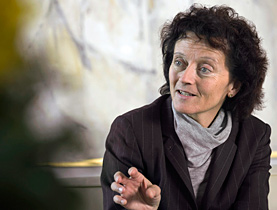
Swiss Justice Minister Eveline Widmer-Schlumpf is hoping emotional factors will not influence the debate surrounding an upcoming vote on banning minarets in Switzerland.
In an interview with swissinfo.ch, the minister also stated that Switzerland would not accept any Guantanamo detainees who pose a security threat. Other topics included when police should be able to publish pictures of suspects on the internet and the dangers of doing so.
Talks are taking place amid a controversial request from the United States for Switzerland to accept detainees from the US military prison at Guantanamo on the island of Cuba.
The minaret initiative, launched by the rightwing Swiss People’s Party and a small ultra-conservative Christian party, will be put to a nationwide vote but the date has not yet been determined.
Muslim organisations have expressed their concern about the initiative, which the cabinet and Parliament reject.
swissinfo.ch: The Swiss authorities have been discussing for months whether to accept Guantanamo detainees – when do you expect to give an answer to the Americans?
Eveline Widmer-Schlumpf: The US authorities will receive an answer as soon as cabinet has reached a definitive decision on whether to accept one or more Guantanamo detainees.
swissinfo.ch: What nationalities are we talking about?
E. W.-S.: I can’t say yet. We aren’t favouring any specific countries. But there are countries whose citizens we won’t accept because we know that it would lead to problems.
swissinfo.ch: What factors are crucial for ruling out a person?
E. W.-S.: We will not accept someone with ties in their past to a terrorist organisation and ties to organisations operating in Switzerland. That would be impossible. We can’t and don’t want to deal with security problems.
swissinfo.ch: In 2008 Switzerland turned down asylum requests from former Guantanamo detainees . does this mean you have now changed your mind on this issue?
E. W.-S.: The decision to turn down the three asylum requests was justified as they did not fulfil the legal criteria for those people to be recognised as refugees.
Concerning the Guantanamo detainees, they are still not considered legally as potential refugees, but as prisoners who have been freed and who need a country to accept them on humanitarian grounds.
swissinfo.ch: But given the current tensions with the US government over banking secrecy and UBS, a negative response to Washington seems, to say the least, unlikely.
E. W.-S.: If criteria such as our responsibility, integration or security are not fulfilled for legal reasons, then we will have to say no.
You can also not tie Guantanamo to other problems – they must be dealt with separately. If all our conditions are met, we take our decision. Of course it would be very good if it helps generate political goodwill and has a positive effect on our bilateral relations with the US.
swissinfo.ch: You want to tighten the rules further on asylum for other people seeking refuge in Switzerland. Why?
E. W.-S.: We need to be coherent in this domain. Compared with neighbouring countries, we have been confronted with a large number of asylum seekers.
swissinfo.ch: Talks about sharing this burden have taken place within the European Union. This has been demanded by Italy, Greece and Malta. Do you agree with this?
E. W.-S.: If Switzerland were to be included, I don’t think it would increase our burden. I reckon that in the medium and longer term we will have to adopt this kind of system. We already have similar experience in Switzerland. Asylum seekers are spread among the cantons depending on the size of their population.
swissinfo.ch: Looking at the vote on banning minarets in Switzerland, how do you explain there is a ballot like this to people abroad?
E. W.-S.: It is the result of direct democracy: citizens get to vote on proposed changes to the constitution. I support this system, even though it can lead to difficult discussions as it has in this case.
There is always tension between political rights and fundamental rights, the constitution and international law.
In Switzerland, we only turn down a people’s initiative when it contradicts international legislation we have agreed to apply. This is not the case with the minaret vote. You could discuss whether this is right or wrong, but in a state where direct democracy is the norm you can’t just avoid the issue by putting it to one side.

More
People’s initiative
swissinfo.ch: You told parliament to trust voters’ judgement…
E. W.-S.: I have a few years experience in cantonal and federal politics and I have seen that citizens are capable of making up their own minds and understanding the consequences of a yes or no vote.
We have already had some very tough debates in the minaret issue. I hope that in the future, discussions will remain factual and steer away from emotional factors.
swissinfo.ch: Another current debate in Switzerland is the publishing of photos on the internet to help police investigations. What is your position?
E. W.-S.: The conditions for the publication of these photos are dealt with by cantonal legislation. Generally this means there must be a concrete criminal act. I think this use of the internet should be restricted to exceptional cases concerning serious crimes, mainly because of the need to ensure privacy. Even if a person has been cleared of wrongdoing, it is hard to “erase” the publication. Once something has been made public on internet, it stays public.
swissinfo.ch: Your capacity to influence this remains restricted though…
E. W.-S.: The cantons are aware that there are limits, and we will discuss the issue with them as well as ways of harmonising practices between them without forcing their hand.
Geraldo Hoffmann and Eva Herrmann, swissinfo.ch
A minaret is a tower, traditionally part of a mosque, with a balcony from which a muezzin calls Muslims to prayer. In modern mosques, the minaret is equipped with loudspeakers.
In Switzerland, only the mosques in Geneva, Zurich and Wangen near Olten have a minaret, Winterthur’s mosque only has a small one. But the call to prayer is not made from these minarets.
Request for minarets in at least two other towns, Langenthal and Wil, led to heated debates at the local level.

In compliance with the JTI standards
More: SWI swissinfo.ch certified by the Journalism Trust Initiative
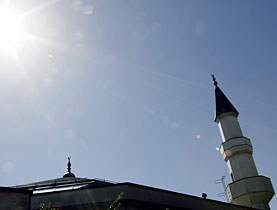
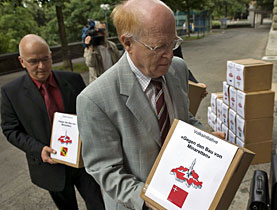
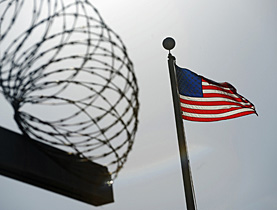
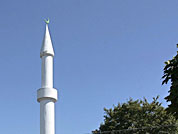
You can find an overview of ongoing debates with our journalists here. Please join us!
If you want to start a conversation about a topic raised in this article or want to report factual errors, email us at english@swissinfo.ch.